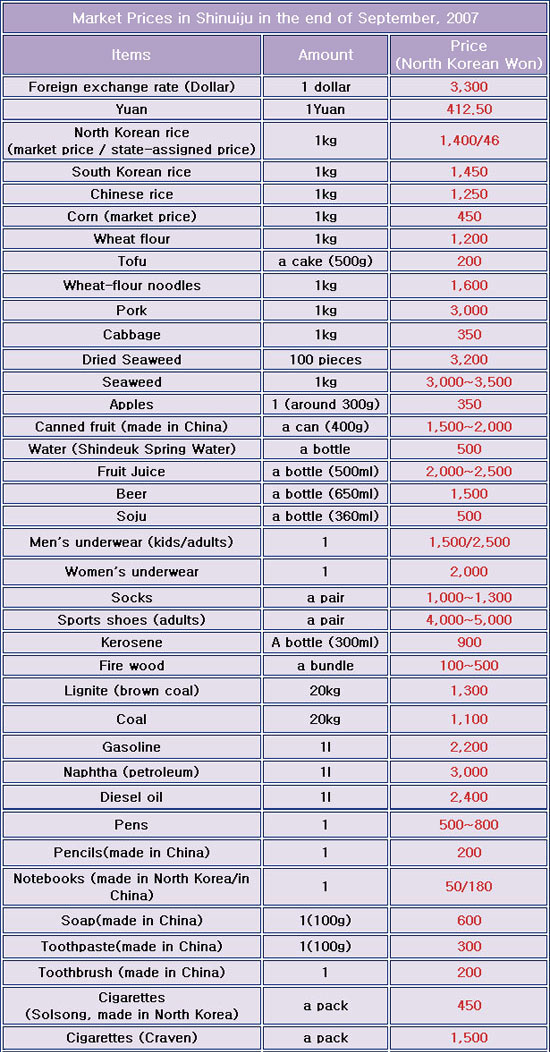Korea Times
Lee Hyo-sik
10/18/2007
Finance and Economy Minister Kwon O-kyu plans to call on the global financial community to increase support for North Korea’s economic projects when he attends the annual meetings of the International Monetary Fund (IMF) and the World Bank in Washington D.C on Oct.20-22. The country’s top economic policymaker will also ask international financial institutions to allow the Stalinist state to become a member.
Kwon is planning to brief IMF meeting participants as well as U.S. administrative officials and lawmakers on the outcome of the inter-Korean summit between President Roh Moo-hyun and North Korean leader Kim Jong-il early this month.
He has said the government will attract funds from the World Bank and other international financial institutions, as well as from the private sector, for a range of large-scale inter-Korean economic cooperation projects, which is expected to cost billions of dollars over the years.
Hyundai Research Institute projected that the establishment of a special peace zone in the West Sea area and other economic cooperation projects between the two Koreas will cost $11.2 billion (10.3 trillion won). The state-run Korea Development Bank (KDB) and other institutions have put forth even larger spending estimates for the envisioned economic cooperation between the two Koreas _ as much as 60 trillion won over the next 10 years.
While in the U.S., Kwon is also scheduled to meet with the U.S. trade representative Susan Schwab to discuss the ratification of the Korea-U.S. free trade agreement (FTA). He plans to ask Schwab as well as other U.S. administrative and congressional officials to urge the Congress to quickly approve the bilateral trade accord.
He will also have a series of interviews with the U.S. media to promote the trade agreement and publicize the second inter-Korean summit. Seoul and Washington signed the deal in June, and Korea submitted the agreement to the National Assembly last month for ratification.
However, there has recently been growing opposition to ratification of the Korea-U.S. FTA in the U.S. Congress. Many lawmakers, including Democratic Party presidential contender Hillary Clinton, are openly opposing the agreement, claiming it will have negative effects on the U.S. manufacturing industry and job growth. They also said Korea should do more to open its markets to U.S. industrial and agricultural products.
To promote Korea as a regional financial hub, minister Kwon plans to hold a meeting with heads of leading international investment banks and prominent financers to ask for more investment in Korea and increasing cooperation with Korean financial firms.
Additionally, a number of local bankers and heads of other financial institutions will converge in the U.S. capital for the meetings and hold talks with executives from global financial institutions.
Bankers include Kookmin Bank President Kang Chung-won, Woori Financial Group Chairman Bahk Byong-won, Shinhan Bank President Shin Sang-hoon, Hana Bank President Kim Jong-ryul and Export-Import Bank of Korea President Yang Cheon-sik.
Among others, Korean Federation of Banks Chairman Yoo Ji-chang, Korea Asset Management Corp. CEO Kim Woo-suk and Korea Investment & Securities CEO Yoo Sang-ho are flying to Washington.
Marcus Noland Response…
N.K. needs technical help before joining int’l financial institutions: U.S. expert
Yonhap
10/19/2007
North Korea must first receive technical assistance from international financial institutions before it can join them and begin receiving monetary aid, a U.S. expert said Friday.
Pyongyang, viewed as one of the most secretive regimes in the world, has to provide certain economic data and follow standardized practices and procedures in order to be able to join financial institutions, Marcus Noland, a senior fellow at the Institute for International Economics, told Yonhap in an e-mail interview.
Noland proposed first inviting North Korea in as an observer “to begin the process of education and technical assistance to support their economic transition” into full membership.
North Korea had said it wanted to join such institutions in 1996, but lost all interest after finding out it would not immediately begin receiving money, according to Noland.
Since then, it has not indicated willingness to adopt the transparency and openness required for membership into the institutions, he said.
Outside aid to the North is heavily constrained by various sanctions, notably by the U.S., which brands Pyongyang as a state sponsor of terrorism. The designation requires Washington to vote against monetary loans and assistance programs to North Korea through international organizations, such as the World Bank and the International Monetary Fund (IMF).
In an annual IMF meeting here next week, South Korean Finance Minister Kwon O-kyu is expected to call on the global community to increase support for North Korea’s economic development, and to allow Pyongyang to become a member of global financial institutions.
His recommendations follow an inter-Korean summit earlier this month that highlighted economic cooperation and progress in six-nation efforts to denuclearize the Korean Peninsula.
Noland questioned whether Pyongyang would be willing to be subjected to the scrutiny required for a membership into the international financial system.
“Frankly speaking, the most important thing that the international financial institutions could immediately provide to the North Koreans is technical assistance,” he said.
“But again, it is not at all clear that they are particularly interested in becoming members of these organizations or reforming their internal practices in ways that would allow them to make full use of membership.”
Such assistance could involve setting up processes, procedures and regulations to reform North Korea’s laws and practices, he said.
North Korea also has to provide the necessary data, a process which international institutions could assist by providing basic standards, such as data collection standards.
North Korea and financial institutions also need to come up with a strategic plan, said Noland. If, for example, Pyongyang wanted to set up a stock exchange, the institutions would assist in starting it and revising relevant laws in the North, he said.

